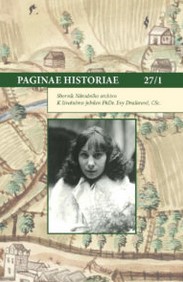SNAHY O KONVERZI PETRA VOKA Z ROŽMBERKA ANEB CO V BŘEZANOVĚ KRONICE NEBYLO
EFFORTS TO CONVERT PETER VOK OF ROŽMBERK, OR WHAT WAS NOT IN THE BŘEZAN’S CHRONICLE
Author(s): Alena PazderováSubject(s): Christian Theology and Religion, 16th Century, History of Religion
Published by: Národní archiv
Keywords: Peter Vok of Rožmberk; Cesare Speciano;
Summary/Abstract: The study details, in chronological order, the efforts of Cesare Speciano, the papal nuncio at the Imperial court in Prague in 1592–1598 to convince Peter Vok of Rožmberk, one of the prominent noblemen of the Kingdom of Bohemia, to a conversion to catholic faith. Although the topic of Peter Vok’s conversion is marginal in the letter exchange between Prague and Rome, 29 pieces of the nuncio’s correspondence bring not only a true image of nuncio’s efforts, but also some unknown details from life of Peter Vok and his wife, and it is, therefore, an interesting testimony of strategies and methods in nuncio’s work with converts and information sources. Peter’s stays in Prague offered to Speciano many opportunities to subtly pressure him using a variety of helpers such as Peter’s relatives from the House of Pernštejn, the Oberst-hofmeister Jiří Popel of Lobkowicz, the Emperor, Prague and Krumlov Jesuits and a secret informant in the Rožmberk palace. The main attack of persuasive actions is concentrated in the period of January – March 1593 when Peter Vok had to deal with serious financial difficulties and could not afford to refuse nuncio’s visits. Even though the resulting image of Peter Vok as a fool, drunkard, and a man with no courage and unable to keep his promises does not correspond to current findings of the Czech historiography, the preserved correspondence reveals some sources of these well-established defamations. Despite all Speciano’s efforts to objectively mediate information to Rome, it is necessary to bear in mind that he offers a subjective point of view on people and events since not all information was rendered with criticality. It is true that the nuncio did not orient himself in the Bohemian milieu well enough to understand, being accustomed to Spanish or Italian catholic milieu, the way of thinking of the Bohemian nobility used to an inter-confessional coexistence, that he was dependent on interpreters and hear-say information since he did not speak local languages, and, finally, that, in pursuit of success, he often overestimated his capabilities and capabilities of his allies. Nevertheless, the nuncio’s correspondence offers many inspiring impulses.
Journal: Paginae Historiae
- Issue Year: 27/2019
- Issue No: 1
- Page Range: 104-125
- Page Count: 22
- Language: Czech

